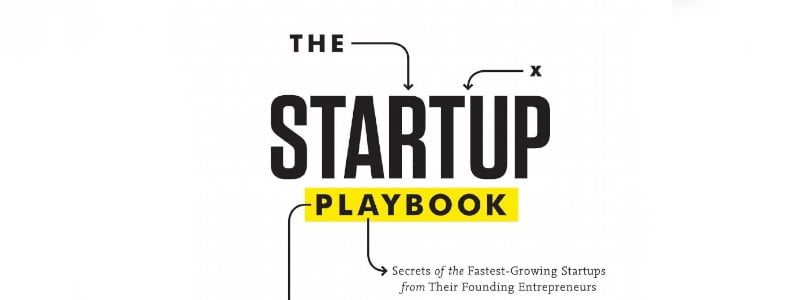The Startup Playbook gives you 10 key success strategies that can improve your business. The minds behind these successful startups share their valuable insights.
The Startup Playbook is one of the best of the many different books, resources, and guides that focus on best practices for entrepreneurial success. Determining what works for your business or startup is a practical process, not a hypothetical exercise — but that doesn’t mean you can’t learn from the entrepreneurs responsible for the most successful startups of all time.
The Startup Playbook by serial entrepreneur David S. Kidder presents the startup strategies of 40 different startup founders such as Priceline’s Jay Walker, Zipcar’s Robin Chase, and Sarah Blakely of Spanx. By breaking down the startup strategies of businesses like LinkedIn, Paypal, and Flickr, The Startup Playbook highlights the key strategies and habits that successful entrepreneurs adopt.
In this article, we’ll cover 10 key takeaways from The Startup Playbook that you can incorporate into your daily life in order to build a better business or startup in Australia.
1. Enter the Market Early
The key to establishing a strong market position, argues the The Startup Playbook, isn’t being in the right place at the right time — it’s being there early.
The Startup Playbook takes direction from LinkedIn founder Reid Hoffman, who summarizes his startup success secret as the ability to spot a trend before it starts. Hoffman searches for and invests in companies with potential that has not been recognized by the market at large.
Before launching LinkedIn, Hoffman’s platform concept was met with derision — why would professionals want a professional social media platform when newspapers, headhunters, and HR specialists already performed the same function? To investors, LinkedIn didn’t appear to be a good bet because the concept that drives it was too early.
LinkedIn was sold to Microsoft in 2016 at a $US26.2 billion price tag — more than $US60 per registered user. Bringing your concept to market ahead of the competition is critical.
2. Anticipate Obvious Problems
If you believe you’ve devised a great idea for a startup, there is a high likelihood that somebody else has already tried it. Startup founders must identify products or services that use the same or similar concepts. Where these products or services failed, you must determine exactly why they didn’t succeed.
Hoffman, when building LinkedIn, observed that the value of a social network was determined by the total number of users registered to it. Without members, new social media platforms were failing. By developing a function that streamlined the process of inviting and adding new members to the LinkedIn network, Hoffman anticipated and solved a major problem that was preventing other similar startups from establishing a market presence.
3. Constantly Visualize Your Goals
In order to succeed in business, it’s essential to remain aware of the goals you want to achieve and how you plan to achieve them. The Startup Playbook analyzes the strategy executed by Sara Blakely, founder of explosively popular hosiery company Spanx.
Blakely highlights visualization as a key factor in the success of Spanx. By creating mental snapshots in which she would visualize the completion of ambitious goals, Blakely was able to drive through difficult periods in the formation of Spanx and establish a business that would be featured by the Oprah Winfrey show — a key goal frequently visualized by Blakely.
4. Keep Secrets
Regardless of how excited you may be about your new startup idea, it’s important to keep your concepts to yourself. Friends, family members, and colleagues may appear to be good sounding boards when evaluating new business ideas, but often become the most vehement critics and detractors.
Constantly defending a concept or business idea against close friends and family can often make it difficult to remain focused on the potential of a product or service. Moreover, startups rely on targeting and dominating niches in which their product is the only solution. Sharing your ideas with others presents the risk that they may steal it from you.
It is essential that startup founders only discuss their ideas and product concepts with investors once their business is already active.
5. Direct Resources to Where They Are Most Effective
The Startup Playbook guides entrepreneurs to identify resources that are being used inefficiently and direct them to where they are needed and so create of new products or services.
In The Startup Playbook, Kidder uses car ownership as an example of inefficient resource usage. Most consumers spend only 5% of their time driving their car — vehicles are typically inert the other 95% of the time, taking up space and resources.
Zipcar founder Robin Chase made this realization, and decided to launch a startup that would allow car owners to share and profit from their cars when not in use. By identifying a pool of inefficiently-allocated resources, Chase was about to create a business that redirected resources to where they were needed, and was wildly successful — Zipcar sold to Avis for $US500 million in 2013.
6. React Quickly to Problems
The idea behind a startup is the deciding factor in its success, but no startup can survive without reacting quickly to problems when they occur.
The Startup Playbook illustrates the importance of fast problem resolution with an example drawn from Zipcar. Three months after the launch, Zipcar founder Robin Chase observed a significant cash flow problem that would rapidly cause the company to go under.
After consulting with the entire Zipcar team, Chase realized that Zipcar prices would need to increase by 25% in order to create a sustainable business model. By identifying and reacting to the problem quickly, Chase was able to re-stabilize cash flow and trade through the deficit. Rapid reaction times are critical to the success of startups in early stages.
7. Lead By Example
A startup is only as strong as the team behind it. The Startup Playbook highlights the importance of developing and maintaining a highly engaged and enthusiastic team of employees as a key driver of success.
Kidder refers to 1998 startup Honest Tea, founded by Seth Goldman, to illustrate the importance of a highly driven employee team. Goldman built the Honest Tea brand up from a small startup to a business that now generates over $70 million annually by functioning as a role model. He ensured that he maintained a strict life, work, and health balance, and ensured that his employees did the same. A healthy team environment creates a healthy business.
8. Nurture Long-Term Customers
The customers that support a startup are critical to its future. Startup founders should consider the cost of capturing new customers versus the long term revenue from retaining existing customers. It is almost always cheaper to retain a customer than to find a new one. So it’s best to focus on establishing a concrete user base of long-term customers.
Long-term customers don’t only create reliable revenue. Creating a core customer base helps to establish and enhance the reputation of a business in the marketplace, reinforcing consumer trust in a brand.
Honest Tea founder Seth Goldman realized that establishing a position as a market leader for children’s products would establish a core base of life-long customers, and thus launched Honest Kids — an Honest Tea product line designed to encourage consumers to remain loyal to the Honest Tea brand for life.
9. Cultivate a Future-Oriented Mindset
Looking toward the future is the modus operandi of every startup founder. However, most startup founders overlook a key principle: what worked yesterday won’t necessarily work tomorrow.
Wearable tech company Jawbone was founded by Hosain Rahman in 1998, decades before the mainstream popularization of wearable technology. Jawbone operated as a market leader in the wearable technology industry for two decades primarily due to the future-oriented mindset cultivated by Rahman.
Rather than focus on adopting the innovations of competitors, Rahman established a business model in which products were refined and updated based on customer feedback. Today, startups must identify and adapt to the evolving needs of their customer base in order to create products that will sell tomorrow.
10. Focus on What the Customer Wants
The final key takeaway from The Startup Playbook is the importance of investing in researching and then meeting customer needs. While customers today are spoilt for choice, it is finding unmet needs that is key.
Kidder provides an example in the form of Jawbone’s “Up” bracelet — the progenitor of most wearable fitness trackers on the market today. Jawbone founder Hosain Rahman created the Up bracelet in response to extensive consumer feedback, incorporating frequently-requested features such as customizable appearances and designs.
The foundation of startup success may be early market entrance, agility, and leadership, but the future of any startup is determined by customer engagement.
Business optimization isn’t limited to research and development — cash flow management and financial strategy is critical to the success of startups in Australia. If you’re currently launching a startup or experiencing a critical growth stage, get in touch with Fullstack for a financial strategy consultation today.
Was this article helpful?
Related Posts
- Small Business Grant
Been hiring recently? You’ll be pleased to note that the NSW government is keen to…
- Startup Funding
Getting your startup funding is an essential skill for most tech startup founding teams. However…
- Crypto Trading as a Business 101
Cryptocurrency trading as a business in Australia can deliver some impressive benefits. Do you qualify…
- Startup Accounting Policies
Startups often have unique business models which can raise difficult questions about the most appropriate…
















